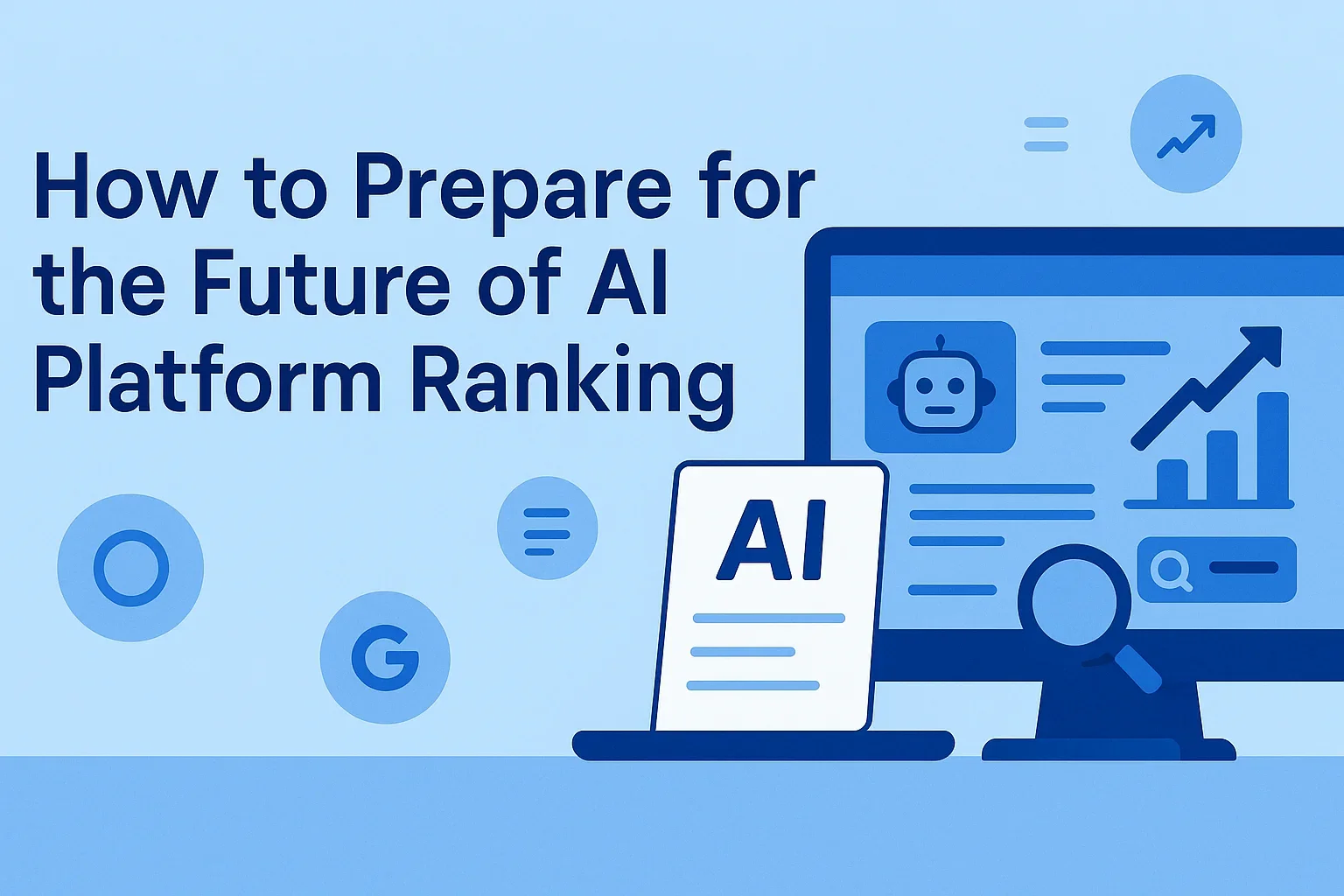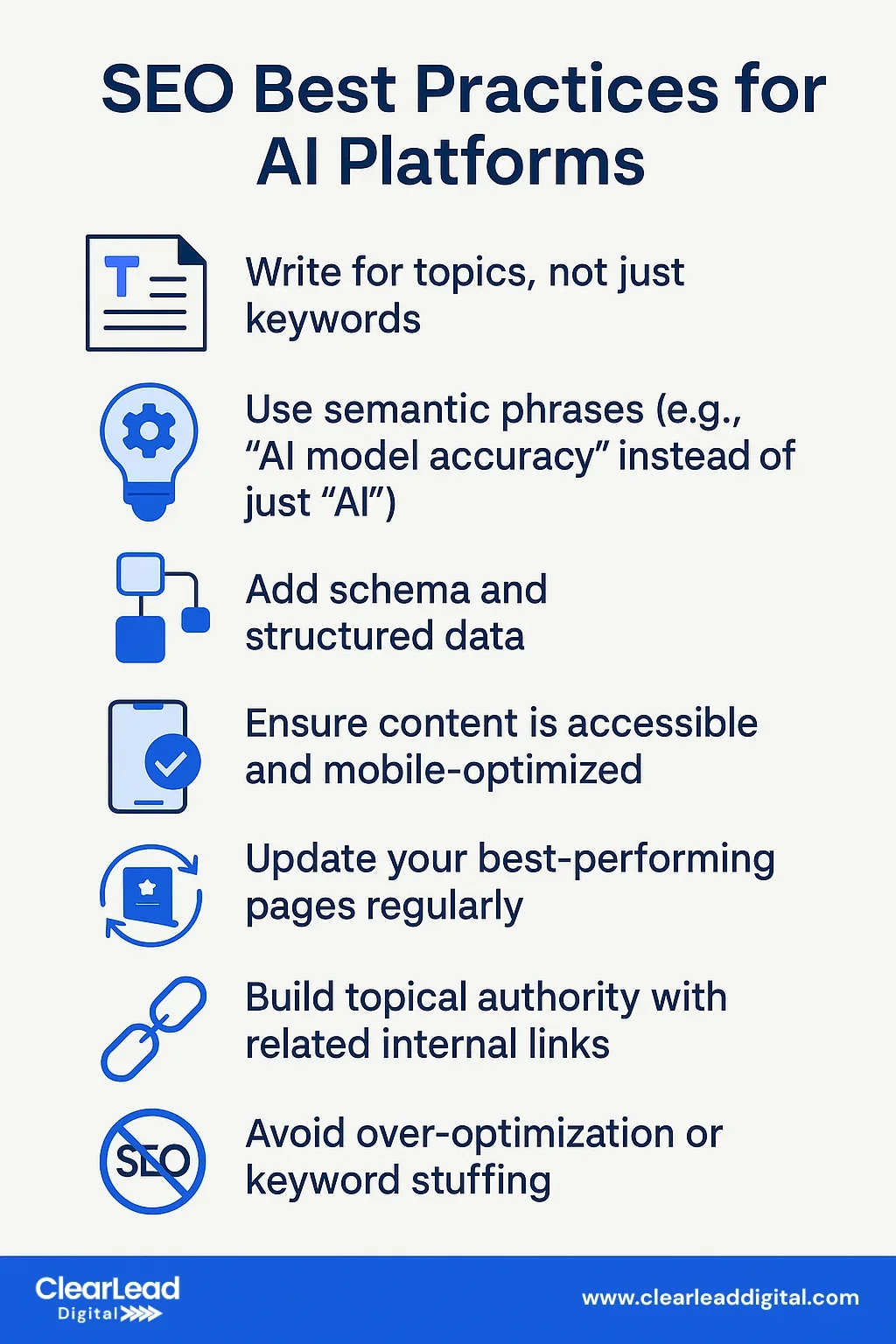How to Prepare for The Future: Ranking on AI Platforms
Ranking on AI platforms is quickly becoming essential for businesses aiming to boost their digital visibility in 2025. Understanding how these intelligent systems evaluate and surface content can give you a major advantage over the competition.
Table of Contents
What is AI Platform Ranking?
AI platforms are changing how people discover and interact with digital content. Whether it’s through ChatGPT voice assistants, recommendation engines, or AI search tools, ranking on these systems now affects visibility as much—if not more—than traditional search engines.
Heading into 2025, understanding how AI platforms rank information is critical for marketers, business leaders, and content creators. Here’s what’s changing, what matters most, and how to stay ahead.
How AI Is Changing Content Discovery
AI isn’t just powering tools—it’s reshaping how users find content across platforms. Language models, machine learning algorithms, and real-time analytics are influencing what people see and when they see it.
Unlike traditional SEO, AI-driven systems don’t rely solely on keywords. Instead, they analyze:
Context and semantic meaning
Engagement signals
Content structure and trustworthiness
As these systems evolve, content must be crafted to align with how AI interprets and ranks information—not just how search engines do.
A big part of this shift is the move away from keyword matching toward understanding natural language. For example, if someone asks a voice assistant, “What’s the best way to boost small business sales in 2025?”, AI platforms don’t just look for pages stuffed with “small business sales” keywords. They try to understand the question's intent, context, and nuances, then surface content that comprehensively answers it.
This means content creators must focus on semantic relevance—covering topics thoroughly and anticipating related questions users might have. It also means building content ecosystems that AI can crawl and interpret easily through internal linking and clear hierarchy.
Why Ranking on AI Platforms Matters
Ranking determines visibility. Whether it’s an article in a chatbot, a product in a recommendation engine, or a report surfaced in a corporate AI dashboard, higher placement leads to more attention, clicks, and conversions.
AI platforms prioritize:
Relevance to user queries
Accuracy and trust signals
Engagement and user behavior
Ethical and unbiased data presentation
If you want your content to surface, it needs to check all these boxes. Simply being informative isn’t enough—you need to match how AI processes and understands content.
This is a fundamental change from traditional SEO, where keywords and backlinks largely ruled. AI ranking systems evaluate how well your content answers a user’s question in context and how credible it appears. For businesses, this means investing in content quality, sourcing, and user experience just as much as keyword research.
AI Ranking Trends to Watch in 2025
Several major trends are shaping how AI platforms rank content and data:
Predictive Analytics
AI is getting better at anticipating user needs. Predictive modeling analyzes behavior, market trends, and past interactions to surface content before it’s requested. If your content isn’t tailored for intent, it won’t show up.
AI-Powered Trading and Finance
In finance, algorithmic trading relies on real-time AI ranking of economic indicators, news sentiment, and signals. Speed and precision matter. Content that feeds into these systems needs to be well-structured and data-rich.
Neural Network Optimization
The better the neural network, the smarter the platform. Optimized models deliver faster, more accurate results—and they prefer structured, relevant content. This includes using schema, internal linking, and semantic structure.
Curious where you rank for your top services? [Get Your Visibility Snapshot]
Continuous AI Model Evaluation
AI systems evolve constantly. Models are retrained and reevaluated, which means your content needs to stay fresh and updated to stay ranked.
Ethical AI Ranking
Fairness and transparency are under a microscope. AI platforms are being tuned to avoid bias and prioritize trustworthy sources. Content that’s accurate, well-sourced, and clearly written ranks higher.
In addition, AI platforms increasingly incorporate user feedback loops. Engagement metrics such as time on page, bounce rate, and repeat visits influence how content is ranked over time. If users consistently find your content valuable, the AI rewards that with better placement.
Another emerging trend is multimodal AI ranking, where systems analyze not just text, but images, video, and audio alongside written content to determine relevance and quality. This will push content creators to diversify their media formats to remain competitive.
How to Optimize for AI-Based Ranking Systems
If you want content to rank in an AI-first world, you need more than traditional SEO. Here’s what matters now:
Focus on Context, Not Just Keywords
Use semantic phrases, related topics, and clear structure. AI looks at meaning, not just matches.
Prioritize Content Structure
Use headers, short paragraphs, and bullet points. AI systems digest structure more easily than walls of text.
Improve Technical SEO
AI platforms factor in site speed, mobile-friendliness, crawlability, and structured data. If your site is slow or messy, content won’t surface.
Build Trust Signals
Use citations, author bios, and transparent sourcing. The more trustworthy your content appears, the better it performs.
Stay Updated
AI models are dynamic. Refresh old content, update data, and adapt to emerging trends. Stale content will lose rank fast.
Digging deeper, structured data markup (schema) is crucial. It helps AI systems understand what your content is about beyond just the text. Adding schema for articles, products, reviews, events, and FAQs increases your chances of being featured in rich results or AI-generated snippets.
User experience also impacts AI rankings. Elements like fast loading times, mobile responsiveness, accessible navigation, and intuitive design signal that your site cares about its visitors. AI rewards that with better visibility.
Engagement metrics remain important. Encouraging comments, shares, and repeat visits sends positive signals. Interactive content such as quizzes, polls, or dynamic tools can improve these metrics.
The Rise of AI-Driven SEO
AI isn’t just something you optimize for—it’s also something you can use. Smart marketers are leveraging AI tools to:
Analyze user behavior
Generate content ideas
Test headlines and variants
Predict performance based on engagement history
This dual role—using AI to optimize for AI—is where the future of SEO is headed.
By employing AI tools, marketers can find gaps in content coverage, identify trending topics, and create content that better matches user intent. AI can also streamline content audits, highlight SEO errors, and recommend technical fixes faster than manual processes.
Content generation tools powered by AI assist in writing drafts, improving readability, and even optimizing for semantic relevance. However, human review remains essential to ensure quality and authenticity.
SEO Best Practices for AI Platforms
Here’s a simplified checklist:
Write for topics, not just keywords
Use semantic phrases (e.g. “AI model accuracy” instead of just “AI”)
Add schema and structured data
Ensure content is accessible and mobile-optimized
Update your best-performing pages regularly
Build topical authority with related internal links
Avoid over-optimization or keyword stuffing
A few more points worth noting:
Make sure your content answers multiple related questions around a core topic to build topical authority. This helps AI see your site as a go-to source. Use internal linking to connect related content naturally.
Don’t overlook voice search optimization. As voice assistants become more prevalent, content that sounds natural when read aloud and answers conversational queries has an advantage.
Make sure metadata—titles, descriptions, and alt text—is clear and descriptive. AI platforms often use these elements to understand and present content.
Ethical and Regulatory Shifts Ahead
AI platforms are coming under more scrutiny, and regulatory frameworks are in the works worldwide. Ranking systems are being pushed toward fairness, transparency, and accountability.
What this means for your content:
Avoid manipulation tactics
Use inclusive, unbiased language
Be transparent about AI-generated content
Focus on long-term trust, not quick wins
Regulators and users alike want AI systems that don’t reinforce harmful biases or spread misinformation. Companies behind these platforms are responding by refining their algorithms to prioritize ethical considerations.
For content creators, this means that quality and integrity are more important than ever. Building trust with your audience and demonstrating credibility through transparent sourcing will pay off.
Transparency about AI involvement in content creation is becoming a best practice to maintain user trust and comply with emerging guidelines.
Final Thoughts: Prepare Now for an AI-Ranked Future
By 2025, AI platforms will be even more central to how people find information. Ranking systems will be smarter, faster, and more nuanced. Businesses and creators who understand how these systems work—and how to align with them—will have a major edge.
It’s not enough to just publish good content. You need to create content that AI understands, trusts, and promotes. Start adapting now.
Want to stay ahead of AI SEO trends?
Subscribe to our updates or request an AI content audit—we’ll help you optimize for the future.
Frequently Asked Questions (FAQs) Ranking on AI Platforms
-
AI platform ranking refers to how artificial intelligence systems prioritize and display content or data based on relevance, trust, engagement, and user intent. It determines what content appears first in AI-powered search, recommendations, or results.
-
Traditional SEO focuses heavily on keywords, backlinks, and structured data for web-based indexing. AI platform ranking goes beyond this—analyzing context, semantic meaning, engagement patterns, and even ethical signals to determine relevance and visibility.
-
Ranking impacts visibility. If your content or product doesn’t surface in AI recommendations, searches, or dashboards, you lose out on traffic, leads, or conversions. Optimizing for AI systems helps you stay competitive as search evolves.
-
To rank higher:
Focus on semantic relevance, not just keywords
Use structured content (headers, bullet points, schema)
Ensure your site is fast and mobile-optimized
Update your content regularly
Write trustworthy, fact-checked material
-
Yes—but they’re just one part of the equation. AI platforms care more about intent, context, and meaning. Using related phrases, answering user questions clearly, and covering topics in depth is more effective than repeating the same keywords.
-
Popular tools include:
Surfer SEO and Frase for semantic optimization
Google Search Console for performance tracking
ChatGPT / Gemini for content ideation
Screaming Frog and Sitebulb for technical audits
Schema Markup Generator for structured data
-
Not completely—but they’re becoming a bigger part of how people discover content. Chat-based search, voice assistants, and recommendation engines are all powered by AI. Expect AI and traditional SEO to overlap more in the coming years.
-
AI systems are being designed to avoid bias and misinformation. Content that is transparent, accurate, inclusive, and unbiased will be favored in future ranking systems. Ethical SEO is now a ranking factor, not just a best practice.
Get the complete guide we used to help property managers dominate their market.



